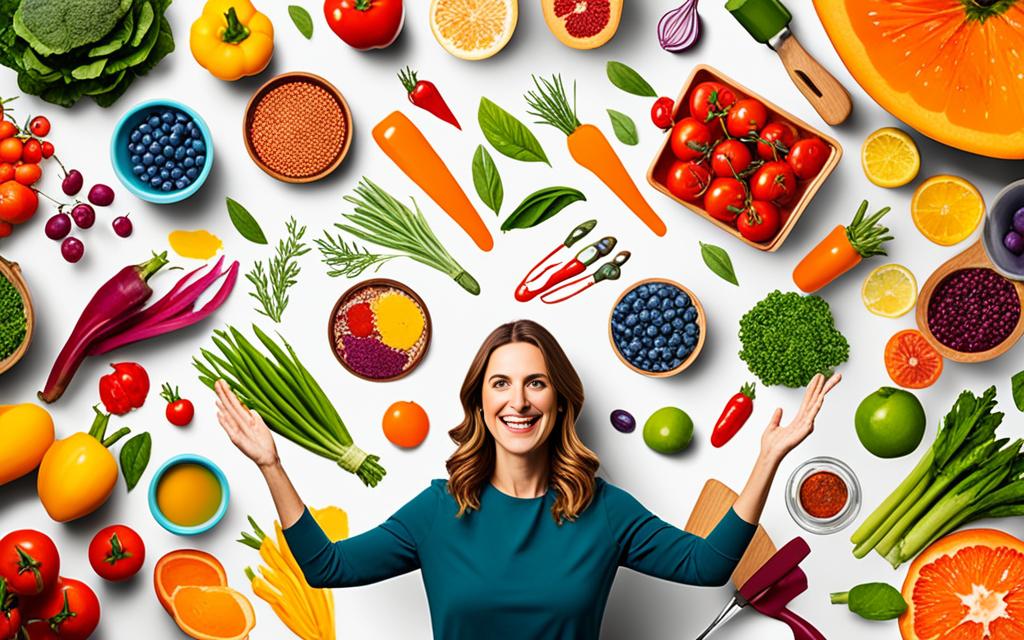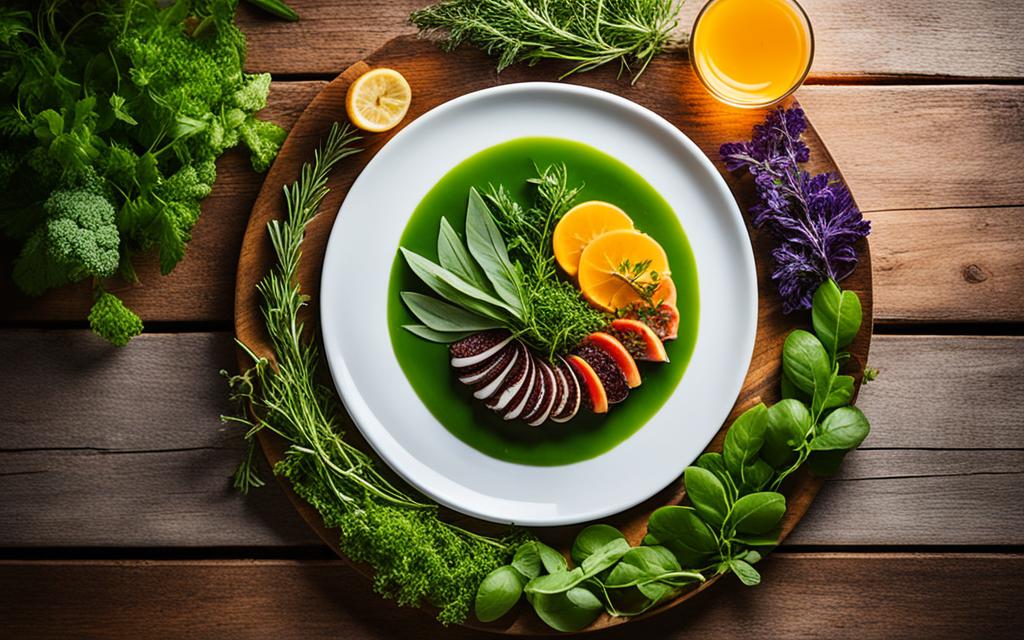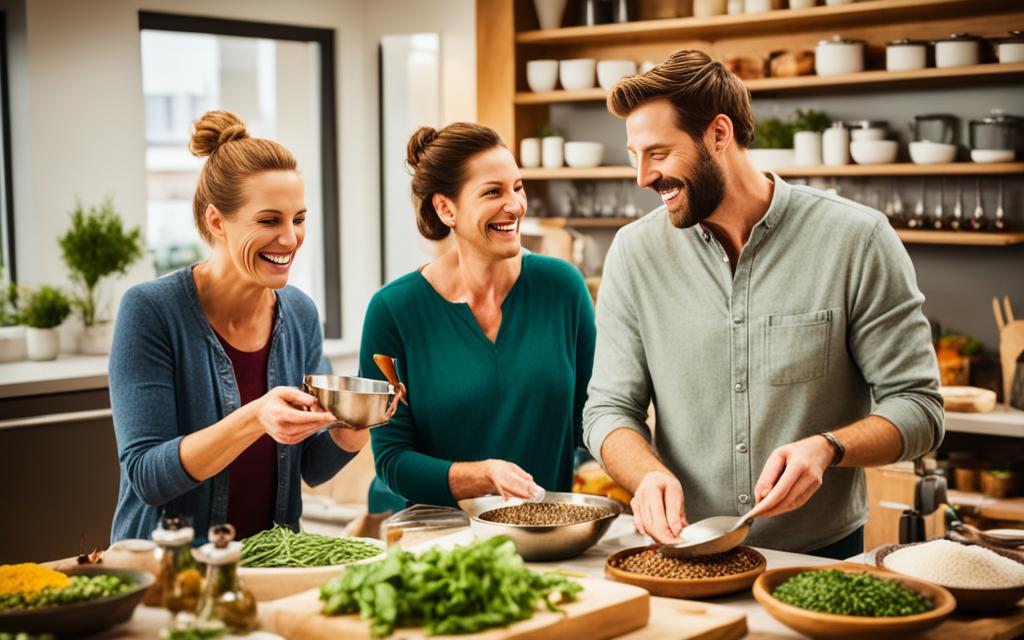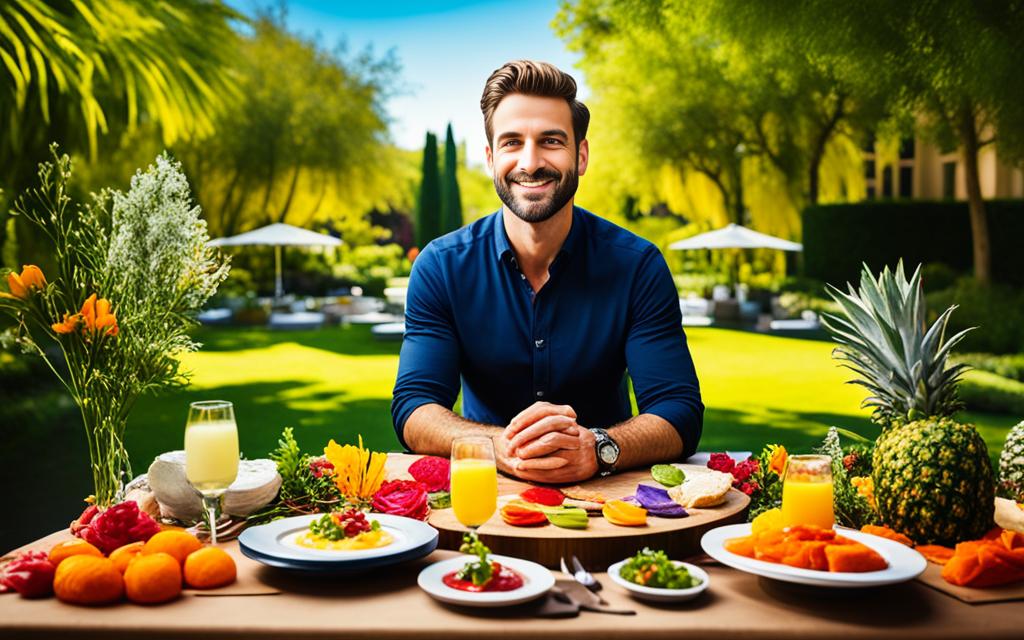Indulging in high-end culinary experiences can have a profound impact on your mental health and well-being. Beyond being a delightful indulgence, these experiences provide therapeutic benefits that promote mental wellness and emotional well-being. Through the combination of exquisite flavors, sensory stimulation, and the artistry of culinary creations, high-end culinary experiences offer a unique avenue for self-care practices and coping strategies.
Key Takeaways:
- High-end culinary experiences can enhance your mental health and well-being.
- These experiences provide a unique avenue for self-care practices and coping strategies.
- The combination of flavors, sensory stimulation, and culinary artistry contributes to the therapeutic benefits of these experiences.
- Indulging in high-end culinary experiences can be a form of emotional and mental health recovery.
- Explore the self-care practices and coping strategies that can be derived from high-end culinary experiences.
Therapeutic Aspects of Culinary Engagement
The culinary process offers a range of therapeutic benefits that can support mental health recovery and stress reduction. Cooking therapy, also known as culinary therapy, harnesses the power of cooking to improve mental well-being and emotional balance. In this section, we will delve into the therapeutic value of cooking, exploring how it provides a sense of control, promotes mindfulness, and offers sensory stimulation. We will also discuss the specific benefits of cooking therapy in managing stress and supporting mental health recovery.
The Therapeutic Value of Cooking
Engaging in the act of cooking can have profound therapeutic effects on your mental health and emotional well-being. When you enter the kitchen and immerse yourself in the culinary process, you create a state of mindful cooking, where you focus your attention on the present moment and the sensory experiences associated with preparing and cooking food.
The act of cooking allows you to take control of your environment and engage in a creative and engaging activity. By selecting ingredients, experimenting with flavors, and following recipes or your own instincts, you tap into a sense of empowerment and agency. This sense of control can be particularly beneficial for individuals seeking to regain a sense of mastery and self-confidence in their lives.
Mindful cooking, characterized by a heightened awareness of your senses, can also promote a state of mindfulness. As you engage with the different textures, colors, and aromas of ingredients, you cultivate a deep sense of presence and focus. This mindfulness not only enhances the cooking experience but can also have a positive impact on your overall mental well-being. Research has shown that mindfulness practices, such as cooking, can reduce stress, enhance mood, and improve overall mental health.
Furthermore, cooking offers a unique form of sensory stimulation. The sights, smells, and sounds in the kitchen can arouse your senses, activating different areas of your brain and promoting sensory integration. This stimulation can have a calming effect on the nervous system, reducing anxiety and promoting relaxation. It can also evoke pleasant memories and associations, enhancing your overall mood and emotional well-being.
| Therapeutic Benefits of Cooking | Examples |
|---|---|
| Enhanced sense of control and empowerment | Choosing ingredients, experimenting with flavors |
| Promotion of mindfulness | Focusing on the present moment, engaging with the senses |
| Reduction of stress and anxiety | Arousal of senses, sensory integration |
| Improved mood and emotional well-being | Eliciting positive memories and associations |
The therapeutic value of cooking extends beyond the act itself. Sharing meals with loved ones, participating in cooking classes or workshops, and exploring new recipes can all contribute to your overall mental health and well-being. By taking part in culinary engagement, you can foster a deeper connection with food, nurture your creativity, and find solace in the therapeutic aspects of the culinary arts.
Mental Health and Well-Being Through Creative Cooking
Engaging in creative cooking can have a positive impact on mental health and well-being. The act of experimenting with ingredients, flavors, and presentation allows individuals to express themselves and tap into their creativity, providing a sense of fulfillment and emotional nourishment.
Culinary creativity serves as a powerful form of self-expression, enabling individuals to infuse their unique personality and style into their creations. Whether it’s innovating with new recipes, combining unexpected flavors, or creating visually stunning dishes, creative cooking offers an outlet for artistic expression.
Not only does creative cooking enhance self-expression, but it also has the potential to boost mood and improve emotional well-being. The process of creating something beautiful and delicious can be incredibly satisfying and uplifting. The act of cooking and witnessing the transformation of ingredients into a culinary masterpiece can spark joy and generate a sense of accomplishment.

“Cooking is like painting or writing a song. Just as there are only so many notes or colors, there are only so many flavors – it’s how you combine them that sets you apart.” – Wolfgang Puck
Furthermore, engaging in creative cooking allows individuals to care for themselves emotionally. It provides an opportunity for emotional nourishment, as the process of cooking can be both comforting and therapeutic. The act of creating a delicious meal not only feeds the body but also nurtures the soul, promoting a sense of well-being and contentment.
By embracing culinary creativity, individuals can find joy, self-expression, and emotional fulfillment in the kitchen. Creative cooking is a powerful tool for enhancing mental health and well-being, offering a personalized and gratifying way to nourish both the body and the mind.
| Benefits of Creative Cooking for Mental Health and Well-Being |
|---|
| Enhances self-expression |
| Boosts mood and emotional well-being |
| Provides a sense of fulfillment and accomplishment |
| Offers an outlet for artistic expression |
| Nurtures emotional well-being through self-care practices |
Enhancing Quality of Life with Memorable Culinary Events
Memorable culinary events have the power to enhance the quality of life by providing unique and satisfying experiences. Experiential dining, characterized by immersive and memorable culinary experiences, can contribute significantly to overall well-being and life satisfaction.
Culinary experiences play a vital role in improving quality of life. They go beyond the act of dining and become transformative moments that create lasting memories. These exceptional experiences provide not only nourishment for the body but also feed the soul. The satisfaction derived from indulging in high-quality dining goes hand in hand with an elevated sense of well-being and life satisfaction.
When you immerse yourself in an experiential dining experience, every element is carefully curated to provide an unforgettable journey. From the moment you enter the restaurant, the ambiance sets the stage, invoking a sense of anticipation and excitement. The attention to detail in the decor, lighting, and music creates a welcoming atmosphere that enhances every bite.
The culinary creations themselves are a work of art, crafted with precision and creativity. Each dish carries a story and evokes emotions through the harmonious interplay of flavors, textures, and presentation. From the first bite to the last, these extraordinary culinary experiences transport you to a world of pleasure, stimulating your senses and creating a sense of connection with the food and the moment.
The exceptional service provided during these memorable culinary events also contributes to the enhancement of the overall experience. Knowledgeable and passionate staff guide you through the menu, offering recommendations and ensuring that every need is met. Their attention to detail and warm hospitality elevate the dining experience and leave a lasting impression.
Culinary experiences not only enhance quality of life in the moment but can also create a sense of loyalty and satisfaction that extends beyond the dining experience itself. When you have a truly remarkable culinary event, you develop a deep connection with the restaurant and its offerings. The memories created during these experiences become a part of your personal narrative, leaving a lasting imprint that can be revisited time and time again.
By prioritizing high-quality dining experiences that are memorable and experiential, you can elevate your overall satisfaction with life and enhance your well-being. So, indulge in the world of culinary artistry, savor every bite, and create unforgettable memories that will enrich your quality of life.
Emotional and Holistic Health Benefits of Gastronomy
Gastronomy, the art and science of good eating, offers profound emotional and holistic health benefits. The connection between food and emotions is well-documented, as certain foods and flavors can evoke specific emotions and positively impact mental and emotional well-being. The enjoyment of delicious and carefully prepared food can uplift your mood, create positive associations, and promote overall well-being.
When you savor a well-cooked meal, it can evoke a sense of comfort, joy, and contentment. The act of indulging in gastronomic delights can be a form of self-care that nourishes not only your body but also your mind and soul. By embracing the pleasures of gastronomy, you can tap into the emotional connection that food brings, enhancing your overall well-being.
One way to cultivate a more mindful and emotionally fulfilling relationship with food is through the practice of mindful eating. Mindful eating involves savoring each bite, truly engaging with the flavors, textures, and aromas of your meal. This practice encourages you to slow down, pay attention to your body’s hunger and fullness cues, and form a deeper appreciation for the nourishment food provides.
By incorporating mindful eating into your culinary experiences, you establish a deeper connection with your food and the emotions it evokes. This can lead to a greater sense of satisfaction, gratitude, and emotional well-being. The act of being fully present and attentive during meals allows you to savor the experience and truly enjoy the nourishing benefits of gastronomy.
Through the emotional and holistic health benefits of gastronomy, you can cultivate a more fulfilling and nourishing relationship with food. By exploring the flavors, textures, and aromas that bring you joy, and practicing mindfulness in your culinary experiences, you can enhance your emotional well-being and overall quality of life.

Stress Management and Coping through High-End Culinary Experiences
High-end culinary experiences can serve as effective stress management tools and coping strategies to help you navigate the challenges of daily life. Engaging in culinary activities, such as mindful cooking or baking, can provide a soothing and therapeutic outlet for stress relief while promoting emotional wellness.
Culinary Activities as Mindful Stress-Relief Practices
When you immerse yourself in culinary activities, you enter a state of mindfulness, focusing your attention on the present moment and the sensory experience of creating delicious dishes. The process of mindful cooking allows you to cultivate a sense of calm and tranquility, providing a break from the stressors of everyday life.
As you chop, sauté, and stir, you become fully absorbed in the culinary process, setting aside any worries or anxieties. This meditative quality of cooking can create a peaceful atmosphere and help you relieve stress, encouraging a sense of mindfulness and well-being.
In addition to the meditative nature of cooking, culinary activities also offer a creative outlet for emotions. When you engage with ingredients, flavors, and recipes, you can channel your emotions into the culinary creation. Cooking can be a way to express yourself and process your feelings, providing you with a therapeutic release during times of stress or emotional turbulence.
The Importance of Choosing Creative Outlets for Emotional Wellness
Emotional wellness is an essential component of overall well-being, and having creative outlets can play a significant role in maintaining emotional balance. By choosing culinary activities as a creative outlet, you tap into your creativity and explore new flavors, techniques, and culinary concepts.
Cooking allows you to experiment with different ingredients, combinations, and presentations, giving you the freedom to express yourself artistically through food. This creative expression can lead to a sense of fulfillment and a boost in emotional well-being.
Moreover, by engaging in high-end culinary experiences, you can transform everyday cooking into a special occasion. Allowing yourself to indulge in the artistry of culinary creations and savoring each bite mindfully enhances the pleasure and enjoyment of the culinary experience, further contributing to your emotional well-being.
Incorporating high-end culinary experiences into your life can be a transformative way to manage stress, cope with challenges, and nurture your emotional well-being. Whether you find solace in the meditative process of mindful cooking or seek creative outlets to express your emotions, the culinary arts offer a rich landscape of possibilities to support your mental and emotional health.
Building Community and Social Connections Through Cooking
When it comes to the culinary arts, the benefits reach far beyond personal enjoyment and nourishment. Cooking has the power to build community and foster social connections, creating a sense of belonging and togetherness. Through the artistry of culinary creations, individuals can engage with one another and form meaningful relationships centered around the shared love for food.
“Food is the ingredient that binds us together.”
Culinary art serves as a powerful means to foster community engagement. Whether it’s through hosting cooking classes, organizing food festivals, or participating in community-supported agriculture programs, cooking can bring people together from diverse backgrounds. It provides a platform for social interaction, allowing individuals to connect, share their cultural heritage, and celebrate the creation of delicious meals.

The act of cooking for others also has a profound impact on emotional well-being. When we prepare meals for loved ones or serve our creations to others, it instills a sense of purpose and fulfillment. Cooking for others allows us to contribute to their well-being and happiness, nurturing both their bodies and their souls.
Research has shown that cooking for others can enhance social interaction, increase feelings of altruism, and promote positive emotions. The act of sharing a meal can create memorable experiences and strengthen bonds between individuals. It fosters a sense of belonging and community, providing a space for shared conversations, laughter, and joy.
Cooking for others not only benefits the recipients but also brings a sense of fulfillment to the person preparing the meal. It allows individuals to express their creativity, care, and love through the culinary process, reinforcing their emotional well-being and sense of purpose. The act of cooking for others becomes a meaningful act of service, allowing us to connect on a deeper level and enrich our lives with shared experiences.
In conclusion, cooking is not just an individual pursuit, but a communal endeavor that has the power to build community, foster social connections, and promote emotional well-being. By engaging in culinary art and cooking for others, we can create lasting connections, celebrate our shared humanity, and find fulfillment in nurturing both ourselves and those around us.
Self-Care Practices within the Realm of Culinary Arts
The culinary arts provide a rich landscape for self-care practices that prioritize nurturing and well-being. In the hustle and bustle of daily life, taking the time to cook for yourself can be a form of self-care that allows you to nourish not only your body but also your soul.
When you engage in the act of cooking for yourself, you are embracing a self-nurturing practice that goes beyond satisfying your hunger. By carefully selecting ingredients, preparing them with love and attention, and savoring the flavors you create, you are actively engaging in a nurturing experience that promotes mindfulness and self-expression.
Cooking for yourself can be a therapeutic act, providing you with a sense of control over your own well-being. It allows you to tailor your meals to your specific dietary needs and preferences, ensuring that you are nourishing your body with wholesome and nutritious ingredients.
Moreover, the process of preparing meals for yourself can become a self-care ritual. From selecting ingredients at the local farmers’ market to chopping, sautéing, and plating, every step can be an opportunity to slow down, be present in the moment, and find joy in the creation of nourishing and delicious food.
By embracing self-care practices within the realm of culinary arts, you empower yourself to prioritize your nurturing and well-being. Through the act of cooking for yourself, you not only provide your body with nourishment but also take a moment to connect with yourself on a deeper level. So, grab your apron, turn on some soothing music, and let the art of cooking become a self-care practice that nurtures your body, mind, and soul.
The Intersection of Positive Psychology and the Culinary World
The culinary world offers more than just gastronomic experiences; it also intersects with the principles of positive psychology, creating a unique opportunity for mental health support and gastronomic creativity. Engaging with high-end culinary practices can yield psychological payoffs, including positive emotions and an enhanced sense of well-being.
Exploring the Psychological Payoffs of Engaging with High-End Culinary Practices
When you indulge in high-end culinary practices, such as fine dining or immersive cooking experiences, you open yourself up to a range of psychological benefits. These experiences can elicit positive emotions, such as joy, excitement, and satisfaction, through the exquisite flavors, artistic presentation, and sensory stimulation they offer. The attention to detail and craftsmanship in high-end culinary practices can create a sense of awe and appreciation, elevating your overall well-being.
Research has shown that engaging with high-end culinary practices can also improve your mental health and emotional well-being. These practices provide a sense of novelty, novelty-seeking being a key element of positive psychology, which helps stimulate your brain, foster creativity, and enhance your overall mood. Experimenting with unique ingredients, flavors, and cooking techniques can create a sense of self-expression and fulfillment, promoting a positive self-image and boosting your overall well-being.
Moreover, high-end culinary experiences often involve social interactions, allowing you to connect with fellow food enthusiasts and professionals in the culinary industry. Social connections and a sense of belonging are crucial for our psychological well-being, and engaging in high-end culinary practices can facilitate the formation of meaningful relationships and a sense of community.
Connecting Mental Health Support with Gastronomic Creativity
The culinary world provides a rich platform for promoting mental health support through gastronomic creativity. Whether you are cooking for yourself, participating in cooking classes or workshops, or exploring new culinary techniques, these activities can serve as therapeutic outlets for emotional well-being.
By engaging in the culinary arts, you can tap into your creativity and find solace in the process of creating something truly unique. It allows you to focus your attention and immerse yourself in the present moment, which can have a calming and soothing effect on your mind. Cooking can be a form of meditation, helping you relieve stress, reduce anxiety, and promote overall emotional wellness.
Furthermore, the act of preparing and sharing meals can foster a sense of connection and emotional nourishment. Cooking for yourself or loved ones can be an act of self-care, nurturing both your physical and emotional well-being. Sharing food with others can create a sense of bonding and enhance feelings of connection and intimacy. The act of preparing and sharing meals can bring joy, satisfaction, and a sense of purpose, all of which contribute to your overall emotional well-being.

In summary, the intersection of positive psychology and the culinary world provides us with a wealth of opportunities to enhance our mental health and well-being. Engaging with high-end culinary practices can elicit positive emotions, foster creativity, and promote overall well-being. The culinary arts offer a unique space to connect mental health support with gastronomic creativity, allowing us to find solace, express ourselves, and create meaningful connections through the power of food.
Conclusion
In conclusion, engaging in high-end culinary experiences can have a profound impact on your mental health and well-being. These experiences offer a range of psychological benefits that contribute to a more fulfilling and enjoyable life. From the therapeutic aspects of culinary engagement to the emotional and holistic health benefits of gastronomy, there are numerous advantages to be gained.
By exploring the role of culinary experiences in quality of life improvement, stress management, building community, and self-care practices, we have highlighted the various ways in which high-end culinary experiences contribute to your mental well-being. These experiences can provide not only a sense of control, mindfulness, and sensory stimulation but also foster social connections and a sense of purpose.
By understanding the intersection of positive psychology and the culinary world, you can embrace the power of gastronomic creativity and mental health support. Whether you are cooking for yourself or others, indulging in creative cooking, or simply enjoying a memorable dining experience, you are nurturing your mental health and promoting overall well-being. So, why not treat yourself to the psychological benefits of high-end culinary experiences and elevate your mental health and well-being?
